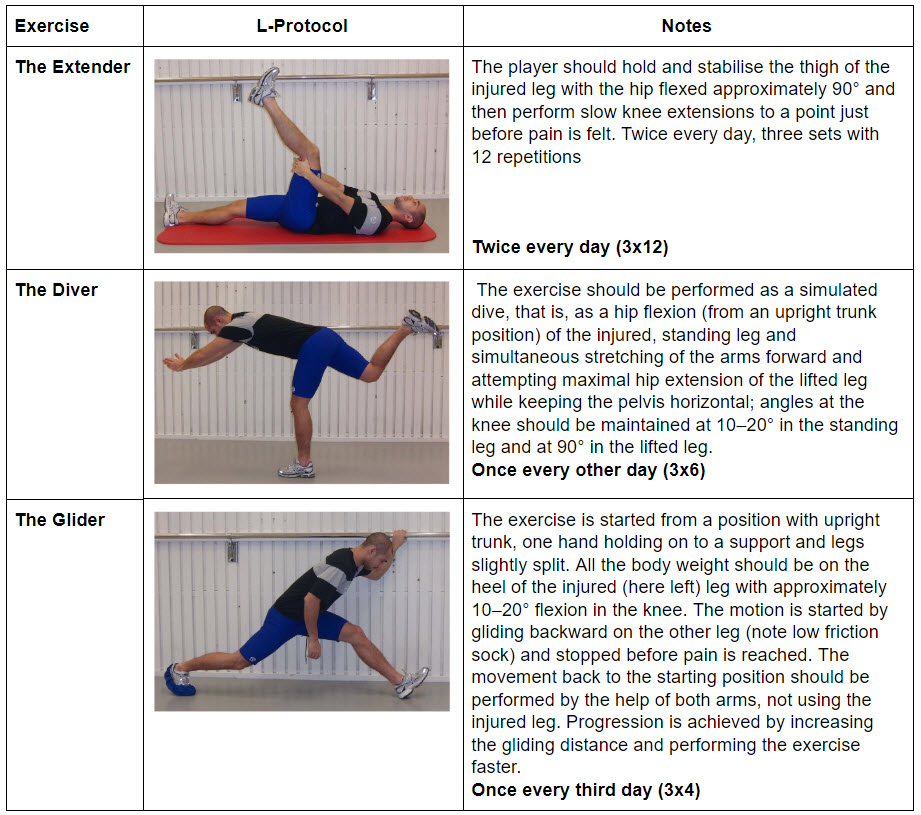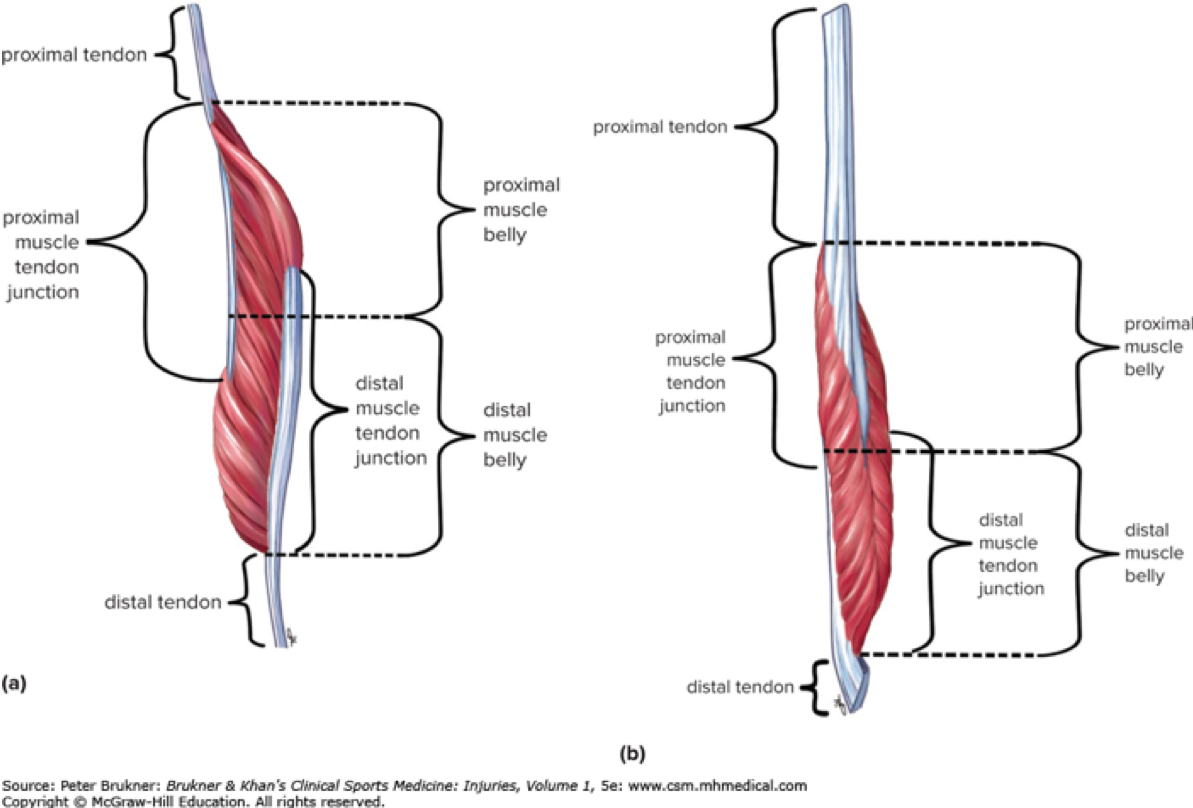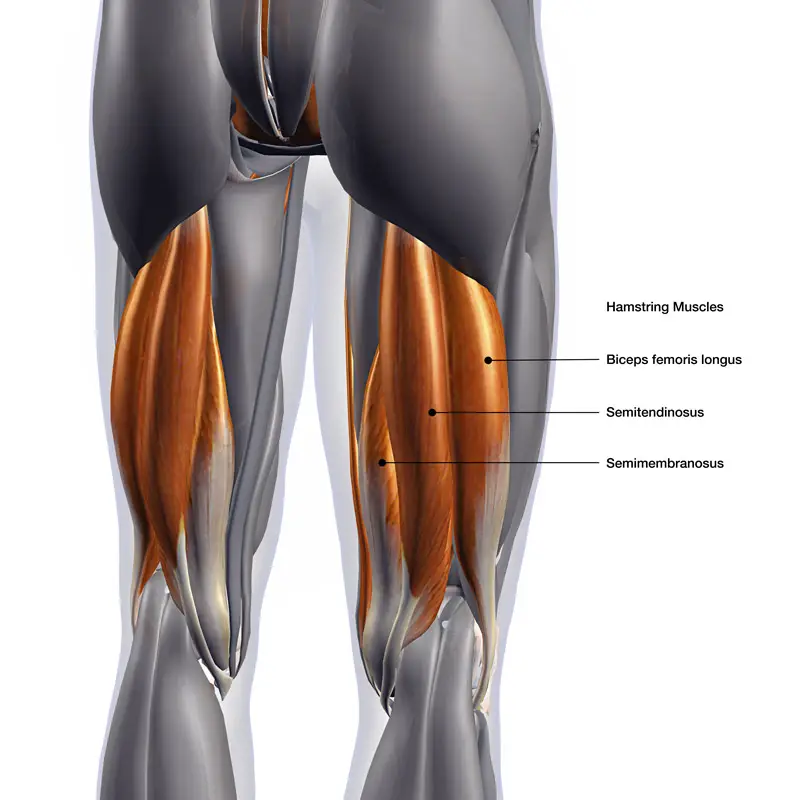
Askling Hamstring exercises YouTube
The Askling L-Protocol comprises three exercises [extender; diver; glider] that load the hamstrings during eccentric activity. When compared to a conventional exercise-based rehabilitation program, the Askling L-Protocol has been shown to reduce the time to return to sport following hamstring injury and prevalence of injury recurrence.

Hamstring injuries (Part 2) Norris Health
In their observational study of online rehabilitation protocols after proximal hamstring tendon repair, Lightsey et al. found a high level of variability in the components and timing of these protocols including strengthening exercises, proprioception exercises, return to basic activity, and return to sporting activity [ 56 ].

EvidenceBased ReturntoPlay Protocol Following Hamstring Strains
Aspetar Hamstring Protocol. Developed following comprehensive, evidence-based research, Aspetar has established the standardised protocol to accelerate the rehabilitation of players from injury. The protocol is aimed at addressing some of the most common aspects of hamstring injuries, which occur mainly in football, but can be adjusted to.

34. Aspetar Hamstring Protocol Full video YouTube
In both protocols, exercise 1 was aimed mainly at increasing flexibility, exercise 2 was a combined exercise for strength and lumbopelvic control, and exercise 3 was a specific strength training exercise (see images and descriptions of the L-protocol and the C-protocol in Figs. 10.2 and 10.3). Intensity and volume of training were matched as.

Getting Back to Sport After Hamstring Injury POGO Physio Gold Coast
Rehabilitation Protocol for Hamstring Injury Non-op This protocol is intended to guide clinicians and patients through the non-operative course for hamstring injury.. Hamstring strain injuries: factors that lead to injury and re-injury. Sports Med. 2012;42(3):209-226. 16. Orchard J, Best TM, Verral GM. Return to play follow muscle strains.

LPROTOCOL FOR HAMSTRING REHAB Origin Series
The L - Protocol for Hamstring Rehabilitation. Hamstring injuries are not only one of the most common sporting injuries, but they also have the highest incidence rate of re injury over any other injury, with up to 1/3 rd of hamstring injuries reoccurring, and typically in the first 2 weeks (Brukner and Khan, 2017).. There are two main types of Hamstring injury:

Best Hamstring Exercise Eccentric Hamstring Progression YouTube
Askling et al13 performed two identical studies, one in footballers and other in sprinters and jumpers,43 and demonstrated that a rehabilitation protocol consisting of mainly lengthening type of exercises (L-protocol) is more effective than a conventional protocol in promoting return to sport after acute hamstring injury. The most conspicuous.

Askling Hamstring Rehab Protocol YouTube
These are the three evidence based rehab exercise to sufficiently rehabilitate a torn hamstring. NOTE: visit your local Physical Therapist before commencing.

Hamstring Rehab L Protocol YouTube
Proximal Hamstring Strain This protocol is intended to provide generalized guidance in the rehabilitation of an athlete with a proximal hamstring strain. Individualized needs of the patient and their activity should be taken into consideration. The therapeutic exercise listed in this protocol conveys the appropriate load for a patient following.

The LProtocol for Hamstring Rehabilitation Hamstrings
However, none of the Askling L-protocol exercises load the hamstring to a high intensity during eccentric contractions, 39 and high-intensity loading appears to be a key component of interventions proven to increase hamstring strength, lengthen long head of the biceps femoris muscle fascicles, and reduce the HSI risk. 40, 41 As deficits in.

Build Hamstring Durability Askling LProtocol
The aim of this paper was to propose rehabilitation protocol for hamstring muscle injuries based on current basic science and research knowledge regarding injury demographics and management options. Conclusions: Criteria-based (subjective and objective) progression through the rehabilitation program will be outlined along with exercises for.

Acute hamstring injuries in Swedish elite sprinters and jumpers a
Hamstring Injury PROTOCOL . STRENGTH. around ankle and leg of chair. Goal. Keeping hips raised, draw heels towards . Frequency = C. h. a. i. r. W. a. l. k. s. Sit on an office chair with wheels on a hard surface Holding onto the chair slowly extend leg . Pushing heel into the ground, pull body/chair forward . Extend injured leg again, and.

Askling Protocol Hamstring Strain Rehabilitation YouTube
1998-2007.1 Hamstring strains were the second most common injury, only surpassed by "knee sprains".1 Numerous studies have shown that hamstring strains are one of the most common injuries in sprinting sports, soccer, rugby and Australian rules football.1-12 Hamstring strains primarily occur at the proximal musculotendon junction.13 Proximal

1.Aspetar Hamstring Protocol Introduction YouTube
Rehabilitation Protocol for Proximal Hamstring Repair This protocol is intended to guide clinicians through the post-operative course for proximal hamstring repair.. Hamstring strain injuries: factors that lead to injury and re-injury. Sports Med. 2012;42(3):209-226. 16. Orchard J, Best TM, Verral GM. Return to play follow muscle strains.

Physical Therapy Hamstring Injury
The Askling Hamstring Protocol has been commonly used to support hamstring strength and durability in athletic performance. This protocol is broken down into the C-Protocol (3 exercises) and the L-Protocol (3 exercises). While the entire paper is worth the read, I have become strongly interested in 'The Glider' exercise (L-3) from the L-Protocol.

Paddle Boarding Fitness What Muscles Does Paddle Boarding Work
• Progression through the protocol should be individualized to the patient's presentation with typical return to. • Nordic hamstring starting with assistance with the upper body. G .,Sturdy T., Gross, A., Bowen, L., Styles, B., Della Villa, S., Davison, M.,Gimpel, M. Br J Sports Med. 2019; 53(7):449-456. 014000-01499 7/20 Proximal.